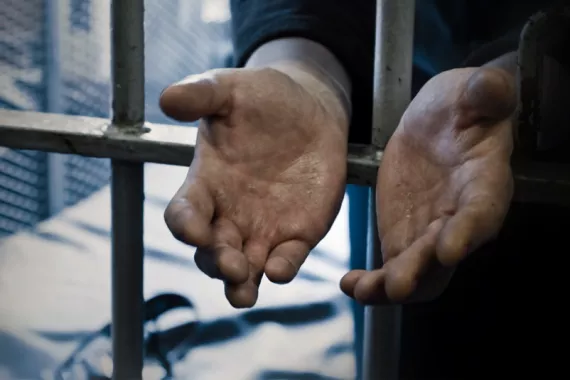
Case Overview
A wrongful imprisonment lawsuit can help victims of unlawful detention by foreign governments or military forces seek justice. These cases often involve human rights abuses such as torture, indefinite confinement or extrajudicial detention.
Key takeaways about wrongful imprisonment
- Wrongful imprisonment includes detention without charges or trial, often by foreign governments or militaries.
- Victims may file lawsuits under U.S. law, including through the Foreign Sovereign Immunities Act.
- Motley Rice brings decades of experience handling international human rights claims and complex cross-border litigation.
What is wrongful imprisonment?
Wrongful imprisonment refers to the unlawful detention of a person by a government or other authority without legal justification, formal charges, or access to a fair trial. Unlike wrongful conviction, which typically follows a flawed legal process, wrongful imprisonment often occurs outside the judicial system altogether. Cases frequently involve victims who are held arbitrarily, without due process, and sometimes subjected to abuse or torture.
While wrongful imprisonment can occur domestically, many cases involve foreign governments and military entities. Victims are often detained during times of political unrest, armed conflict or authoritarian crackdowns.
These detentions may be motivated by efforts to silence dissent, punish perceived political enemies, or exert control over occupied regions. Victims may include journalists, activists, humanitarian workers or other civilians caught in conflict zones.
Types of wrongful imprisonment include:
- Unlawful detention without charges: Holding individuals in custody without informing them of the accusations or initiating legal proceedings.
- Political imprisonment: Detaining individuals because of their political beliefs, public advocacy or criticism of a government or regime.
- Military or extrajudicial detention: Seizing and holding individuals in conflict zones or under martial law without access to courts or legal representation.
In many cases, wrongful imprisonment also involves physical and psychological abuse, denial of medical care, or coercion into confessions. Victims may be cut off from contact with family or legal counsel. This violates internationally recognized human rights protections under the International Covenant on Civil and Political Rights (ICCPR) and other treaties.
How wrongful imprisonment cases differ from wrongful conviction cases
Although the terms are sometimes used interchangeably, wrongful imprisonment and wrongful conviction are distinct legal concepts. Each has its own causes, consequences, and remedies. Wrongful conviction refers to a situation where an individual is found guilty of a crime they did not commit, typically because of errors in the domestic justice system.
Wrongful imprisonment, in contrast, frequently occurs outside the bounds of any criminal trial. Victims may be imprisoned by foreign governments, paramilitary groups, terrorists or other state actors in settings where no formal legal charges are filed.
The legal avenues available to victims also differ. Wrongful imprisonment cases involving foreign governments usually require navigating complex federal laws like the Foreign Sovereign Immunities Act (FSIA) or the Torture Victim Protection Act (TVPA). These are statutes specifically designed to allow for limited exceptions to the broad protections afforded to foreign states.
Can you sue for wrongful imprisonment by a foreign government?
Yes. In certain circumstances, victims of wrongful imprisonment by a foreign government or military force may be able to file a civil lawsuit in U.S. federal court. While international law typically protects foreign states from being sued through a principle known as sovereign immunity, there are key exceptions under U.S. law.
Foreign Sovereign Immunities Act (FSIA)
The Foreign Sovereign Immunities Act (FSIA) governs when and how a foreign government can be held liable in a U.S. court. Though it generally shields foreign entities from litigation, FSIA contains exceptions that apply in cases involving:
- Torture or inhumane treatment
- Extrajudicial detention
- Hostage-taking
- Terrorism
- Personal injury or death caused by wrongful acts
The Torture Victim Protection Act (TVPA)
The Torture Victim Protection Act (TVPA) allows civil actions against individuals acting under foreign authority for acts of torture or extrajudicial killing.
While FSIA applies to lawsuits against foreign states, the TVPA targets specific officials—such as military, law enforcement or political leaders. To bring a claim under the TVPA, plaintiffs must typically:
- Show that the defendant acted “under color of foreign law”
- Prove that the abuse involved torture or extrajudicial killing
- Demonstrate that they exhausted available remedies in the country where the abuse occurred
Wrongful imprisonment compensation and available legal remedies
Victims of wrongful imprisonment by foreign governments may be entitled to compensation under U.S. and international law. These cases aim to provide financial relief for those who suffered extreme hardship. However, they also help to hold foreign state actors accountable for violating fundamental human rights.
While legal outcomes vary by jurisdiction and case facts, several remedies are available. Types of compensation include:
- Economic damages for tangible losses such as lost wages, lost earning capacity, medical expenses and legal costs incurred because of the wrongful detention.
- Non-economic damages for intangible harms such as emotional distress, psychological trauma, pain and suffering and loss of liberty.
- Punitive damages in cases involving extreme misconduct such as deliberate torture, political persecution or abuse while in custody.
Why hire wrongful imprisonment lawyers?
Despite these legal avenues, filing a wrongful imprisonment lawsuit against a foreign state is complex and requires navigating several challenges, including:
- Proving the foreign state’s actions meet an FSIA exception
- Establishing jurisdiction and proper service under federal law
- Navigating diplomatic sensitivities and enforcement barriers
- Working with limited access to foreign witnesses or records
For these reasons, pursuing justice in international wrongful imprisonment cases requires a legal team with deep experience in human rights litigation and cross-border accountability.
Motley Rice has represented victims of wrongful imprisonment and torture in lawsuits against foreign governments and political regimes. Our human rights professionals have pursued cases involving:
- Alleged human rights abuses, including arbitrary detention, torture and persecution of political dissidents in Venezuela
- Victims harmed or unlawfully detained by terrorist organizations receiving support from foreign states
- Individuals unlawfully detained in occupied territories or during civil unrest, often in cases where governments used imprisonment as a tool of suppression.
Frequently asked questions about wrongful imprisonment
What payment is available for wrongful imprisonment?
Victims of wrongful imprisonment may be eligible for financial compensation that includes both economic and non-economic damages, including lost wages, medical expenses and compensation for psychological harm and emotional trauma.
Is there federal compensation for wrongful imprisonment?
In some cases, individuals can pursue federal compensation for wrongful imprisonment by filing a lawsuit under the FSIA or TVPA.
Are wrongful conviction cases the same as wrongful imprisonment cases?
No. Wrongful conviction cases involve individuals who are found guilty of crimes they did not commit, often because of flaws in the justice system. Common causes include false confessions, eyewitness misidentification, official misconduct or forensic science errors.
In contrast to wrongful imprisonment, wrongful convictions include the victim going through a formal legal procedure such as a trial.
Is wrongful imprisonment common?
Reliable data on wrongful imprisonment by foreign governments is limited, particularly in authoritarian regimes where recordkeeping and transparency are poor. However, advocacy organizations such as Human Rights Watch have documented thousands of cases involving arbitrary detention, torture and political imprisonment each year.
Our human rights litigation experience
Motley Rice has a long-standing commitment to advocating for victims of human rights abuses. That includes those who have been wrongfully imprisoned by foreign governments or state-sponsored entities. Our attorneys bring decades of experience in complex civil litigation involving international law, sovereign immunity, anti-terrorism claims and cross-border investigations.
We have pursued accountability against foreign officials and regimes involved in torture, arbitrary detention and extrajudicial punishment.
Our litigation experience spans a wide range of state and non-state actors, from totalitarian regimes to sponsors of terrorism. We understand the sensitivity, strategy and endurance required to hold powerful governments accountable in U.S. courts. We are committed to standing with survivors in their pursuit of justice.
Read more on our human rights litigation experience.
Key takeaways
What is wrongful imprisonment?
Can you sue for wrongful imprisonment by a foreign government?
Wrongful imprisonment compensation and available legal remedies
Why hire wrongful imprisonment lawyers?
Frequently asked questions about wrongful imprisonment
Our human rights litigation experience
- Sources
- Human Rights Watch. Human Rights Watch.
- United Nations. International Covenant on Civil and Political Rights.
- U.S. Department of Justice. Torture Victim Protection Act (TVPA).
- U.S. Department of State. Foreign Sovereign Immunities Act (FSIA).
Start Your Motley Rice Consultation in Simple Steps
Submit Information
Call us or fill out our online form with the details of your potential case.
Case Review
Our team reviews your information to assess your potential case.
Case Consultation
Talk with us about next steps.


